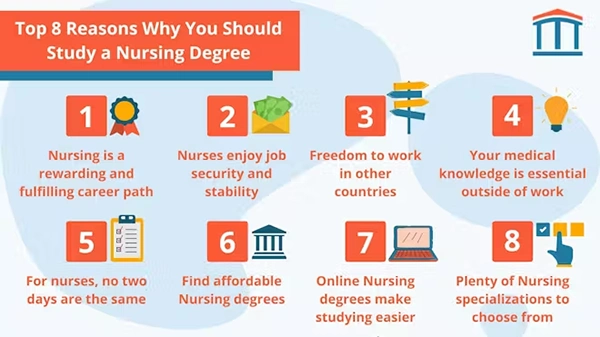
Did you know? Nurses are consistently ranked as one of the most honest and ethical professions. (Source)
Today, we live in a world that is constantly revolving around new technologies and innovation that can help us to grow sustainably in the future.
And among these extensive industries, healthcare is the most prominent among them which is rapidly trying to streamline human complexities.
But one thing that has remained the same from the ages in this sector is the never-ending need for expert nursing staff.
As we all know that nurturing by professionals plays a crucial role in the patient’s recovery, and that’s why significance is important for almost every hospital.
But how can someone become eligible for this career option?
Well, whether you’re just starting in the field or looking to advance your career, selecting the right program can set you up for long-term success, and in this blog post, we are going to cover all the courses thoroughly.
Let’s begin!
Key Takeaways
- Understanding everything about the different nursing degrees and their captivating benefits.
- Elaborating on all the necessary factors involved in the nursing degree selection.
- Unfolding various metrics involved in making the right choice for your future.
Understanding the Different Nursing Degrees
Nursing degrees come in several levels, each designed for different career goals. Here are the primary options:
- Associate Degree in Nursing (ADN)
- Typically takes two years to complete.
- Prepares graduates for the NCLEX-RN exam to become a registered nurse (RN).
- Provides a faster path into the workforce but may restrict long-term career advancement.
- Bachelor of Science in Nursing (BSN)
- Usually takes four years or less in an accelerated program.
- Offers a more in-depth education in nursing theory, research, and leadership.
- Preferred by many hospitals and healthcare institutions, often resulting in higher salaries and better job prospects.
- Master of Science in Nursing (MSN)
- Designed for nurses looking to specialize or move into leadership roles.
- Required for nurse practitioners (NPs), nurse educators, and administrative positions.
- It may take two to three years to complete after a BSN.
- Doctor of Nursing Practice (DNP) or PhD in Nursing
- The DNP focuses on clinical practice, while the PhD emphasizes research and education.
- Typically pursued by nurses aiming for top leadership, research, or academic roles.
Intriguing Insights

This infographic shows 8 reasons to pursue a medical nursing degree
Factors to Consider When Choosing a Nursing Degree
Selecting the right nursing degree depends on several factors, including career goals, time commitment, and financial considerations.
- Career Goals –If you’re eager to jump into nursing, getting an ADN could be your quickest route. But if you’re thinking about the future and want to earn more down the line, going for a BSN or MSN might be the smarter move.
- Flexibility – Many programs offer part-time, evening, or online options for working professionals. Programs such as UTA online degrees allow students to pursue higher education while maintaining their job responsibilities.
- Accreditation: To satisfy licensing and employer requirements, confirm that the program has been accredited by agencies such as the Commission on Collegiate Nursing Education (CCNE) or the Accreditation Commission for Education in Nursing (ACEN).
- Tuition varies widely, so look into financial aid, scholarships, and employer tuition reimbursement programs to cut costs.
Did you know?
There’s a significant global shortage of nurses, with the World Health Organization (WHO) estimating a shortage of 4.5 million nurses by 2030. This high demand translates to strong job prospects for nurses, including those with a BSN.
Making the Right Choice for Your Future
The nursing profession provides numerous career options, but selecting the right degree is critical for success. Take time to research programs, assess your career aspirations, and consider long-term job prospects. Whether you begin with an ADN or immediately enter a BSN program, furthering your education will lead to more opportunities and greater professional fulfillment. By selecting the degree that aligns with your goals, you can build a rewarding career in nursing while making a meaningful impact in healthcare.
Ans: Nursing is the nation’s largest healthcare profession, with nearly 4.7 million registered nurses (RNs) nationwide. Of all licensed RNs, 89% are employed in nursing. The median age of RNs is 46 years
Ans: You’ll spend a lot of time with your patients, which means you’ll no doubt develop relationships with them. In doing so, you’ll find that many of your patients will inspire you with their strength, their optimism, and their willingness to fight against overwhelming odds.
Ans: The highest academic degree in nursing is typically the Doctor of Nursing Practice (DNP), which is a terminal degree focused on advanced practice and leadership in nursing.
Ans: The most widely recognized symbol of nursing is the Caduceus, often mistakenly associated with medicine in general. The Caduceus is a staff entwined with two snakes, and while it’s the traditional symbol of the Greek god Hermes, it’s commonly used in the United States as a symbol of medicine, including nursing.
Ans: Several types of nurses are currently in high demand, particularly those with advanced practice, specialized skills, and experience in critical care or long-term care settings. Specific specialties like Nurse Practitioner (NP), Clinical Nurse Specialist (CNS), and Certified Registered Nurse Anesthetist (CRNA) are consistently sought after.